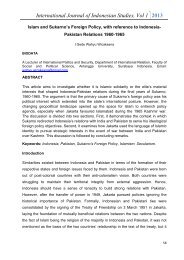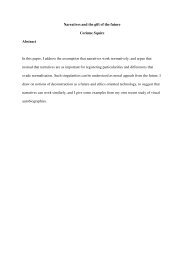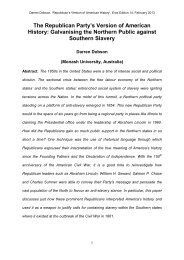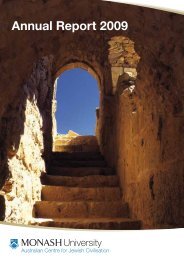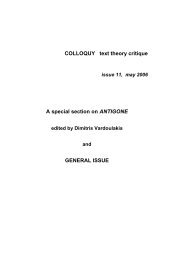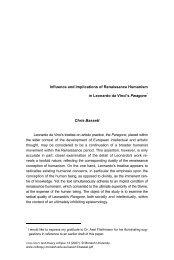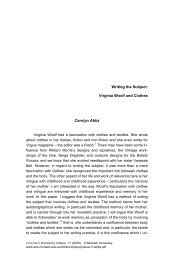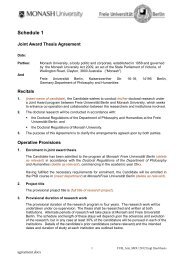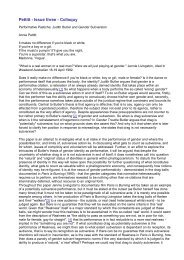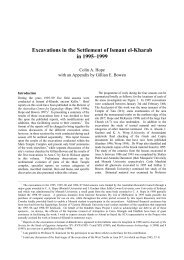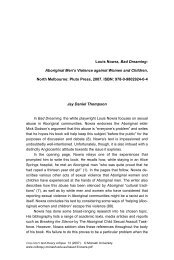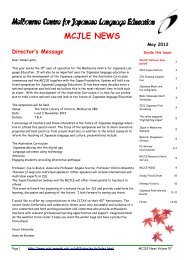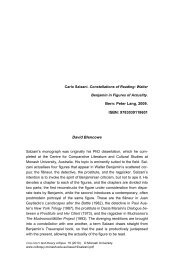The Acknowledgement of Love in Sarah Ruhl's Drama ... - Arts
The Acknowledgement of Love in Sarah Ruhl's Drama ... - Arts
The Acknowledgement of Love in Sarah Ruhl's Drama ... - Arts
You also want an ePaper? Increase the reach of your titles
YUMPU automatically turns print PDFs into web optimized ePapers that Google loves.
░ <strong>The</strong> <strong>Acknowledgement</strong> <strong>of</strong> <strong>Love</strong> <strong>in</strong> <strong>Sarah</strong> Ruhl’s <strong>Drama</strong> 11<strong>The</strong> Two Doomed <strong>Love</strong>s <strong>of</strong> EurydiceIn October 2006, D<strong>in</strong>itia Smith wrote <strong>in</strong> <strong>The</strong> New York Times: “Jockeyshave the Triple Crown, hockey players have the three-goal hat trick, butthere is no equivalent <strong>in</strong> the theatre for what has been happen<strong>in</strong>g to <strong>Sarah</strong>Ruhl lately.” 17 Smith is referr<strong>in</strong>g to the well-timed open<strong>in</strong>g <strong>of</strong> <strong>The</strong> CleanHouse at New York’s L<strong>in</strong>coln Center, the success <strong>of</strong> Eurydice at the YaleRepertory <strong>The</strong>atre, and the announcement <strong>of</strong> Ruhl’s MacArthur award. Eurydicepremiered at the Berkeley Repertory <strong>The</strong>atre <strong>in</strong> 2004, ran at the YaleRep. <strong>in</strong> 2006, and then opened <strong>in</strong> New York <strong>in</strong> 2007. In his review <strong>of</strong> theYale Rep. production, described as “devastat<strong>in</strong>gly lovely—and just pla<strong>in</strong>devastat<strong>in</strong>g,” Charles Isherwood asserts, “Eurydice is ultimately about thepa<strong>in</strong>ful choice that comes with the pass<strong>in</strong>g <strong>of</strong> joys and pleasures: whetherto remember, <strong>in</strong> sadness, or to forget, and achieve a calm but emptier equilibrium.”18 Also at the core <strong>of</strong> this play, which Ruhl dedicated to her father,is the matter <strong>of</strong> how death and loss affect romantic love. <strong>The</strong> Clean Houseexam<strong>in</strong>es a k<strong>in</strong>d <strong>of</strong> non-romantic love capable <strong>of</strong> acknowledg<strong>in</strong>g mortality,but it stops short <strong>of</strong> <strong>in</strong>quir<strong>in</strong>g <strong>in</strong>to whether mortality is squarely <strong>in</strong>compatiblewith dreamy, Orphic love. To get at this issue, Ruhl turns to the myth <strong>of</strong> Eurydiceand Orpheus. Accord<strong>in</strong>g to the myth, soon after Eurydice and Orpheusare married, Eurydice is bitten by a snake and dies. Her griev<strong>in</strong>ghusband descends to the underworld to retrieve her. He is granted permissionto lead her back to earthly life so long as he does not turn to look ather as they climb to the upper world. Near the threshold, Orpheus steals aglance at his trail<strong>in</strong>g wife, and, just as quickly, Eurydice plunges back to theunderworld. And, alas, they are forever separated. 19Traditional accounts <strong>of</strong> the myth tend to emphasise Orpheus’s braveryand impatient desire. In Ovid’s Metamorphoses, for example, Orpheus’sboldness and gallantry are central: “Up the slop<strong>in</strong>g path, through the mutesilence they made their way, up the steep dark track, wrapped <strong>in</strong> impenetrablegloom, till they had almost reached the surface <strong>of</strong> the earth. Here,anxious <strong>in</strong> case his wife’s strength be fail<strong>in</strong>g and eager to see her, the loverlooked beh<strong>in</strong>d him, and straightway Eurydice slipped back <strong>in</strong>to thedepths.” 20 Ovid says little more about Eurydice than that she felt pa<strong>in</strong> <strong>in</strong> herheel from her fatal snake-bite as she waited for her husband to rescue her.<strong>The</strong> tendency to downplay Eurydice caught Ruhl’s attention: “I’d seen somany beautiful retell<strong>in</strong>gs from Cocteau to Black Orpheus, but rarely doesanyone look at Eurydice’s experience. I always found that troubl<strong>in</strong>g—she’sthe one who dies and takes a journey before Orpheus, but we don’t reallysee her experience.” 21 Ruhl notes one exception: Rilke’s poem “Orpheus.Eurydice. Hermes.” In this poem, Eurydice is described as “uncerta<strong>in</strong>, gentle,and without impatience” as she waits for Orpheus. 22 Death, surpris<strong>in</strong>gly,



